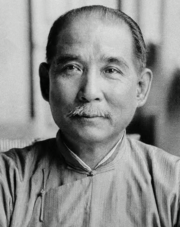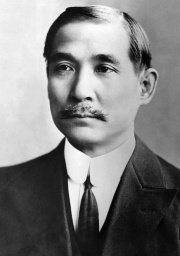Zhou Wei-lin
| Zhou Wei-lin | |
|---|---|
| 周维林 | |
 President Zhou in 1943 | |
| 3rd President of Laeral | |
| In office 1942–1947 | |
| Vice President | Alban Hamel |
| Preceded by | J.P. Salaun |
| Succeeded by | Sun Jia-wei |
| 5th Minister of Public Works | |
| In office 1934–1938 | |
| President | J.P. Salaun |
| Prime Minister | Hong Kuo-shu, Julien Cheng |
| 37th Mayor of Laeralsford | |
| In office 1931–1934 | |
| 3rd Minister of Education | |
| In office 1926–1931 | |
| President | René Gramont |
| Prime Minister | J.P. Salaun |
| Personal details | |
| Born | January 9, 1885 |
| Died | November 15, 1968 (aged 85) |
| Nationality | Laeralian |
| Political party | Social Democratic Party |
| Spouse(s) | Zhou Shu-fen |
| Military service | |
| Service/branch | Rose Army |
| Years of service | 1918-1922 |
| Rank | Major |
Zhou Wei-lin was a Laeralian soldier and politician who served as the third president of the Republic of Laeral from 1942 to 1947. A military aide-de-camp to René Gramont during the First Fellsian War and the Laeralian Revolution, Zhou served as a cabinet minister during the 1920s and 30s before unexpectedly becoming president of Laeral in 1942. Zhou's agenda of political liberalization was stalled by opposition within his own Social Democratic Party, and he was not nominated for reelection in 1947.
Zhou remained active in Social Democratic Party politics during the later Republican Era and after the transition to democracy. Following President Gramont's Declaration of National Emergency in 1964, Zhou criticized his former mentor's decision and was expelled from the party. That year, Zhou and other members of the SDP's liberal wing founded the Progressive Party of Laeral. He died in 1969.
Early Life and Military Career[edit | edit source]

Born to a tradesman family in Harcour in 1885, Zhou unsuccessfully pursued a career as a merchant in Althea, where he first crossed paths with René Gramont as neighbors. Although he briefly attended a commercial college and took courses in typing and accounting, he never attained a college degree. In 1908, following the bankruptcy of his laundry business, Zhou enlisted in the Laeralian Army and was commissioned as a lieutenant.
Following the outbreak of the First Fellsian War in 1911, Zhou was mobilized to northern Laeral and was reacquainted with Major René Gramont in 1914, who took Zhou as his aide-de-camp due to the younger man's secretarial experience and fluency in Mandarin, which Gramont hoped to practice. Following the war, Gramont and Zhou remained close, and Zhou became active in veterans' organizations alongside Gramont.
During the Laeralian Revolution, Zhou was elected as a leader of the Committee for Democracy and Progress, and assisted in the drafting of the Renfeng Platform. With the rank of Major in the Rose Army, he served as aide-de-camp to Gramont during the early war. In 1920, as Loyalist forces advanced into Republican territory, Zhou was given an independent command with J.P. Salaun's Northern Front, where he ably led Rose Army forces in support of the Changyu Offensive's northern arm.
Ascension to Power[edit | edit source]
Following the war, Zhou served on the Laeralian Republic's constitution drafting committee. Initially passed over for high office in the first Republican government, Zhou was instead appointed as personal secretary to President Gramont, a position equivalent to the modern-day chief of staff. In 1926, fulfilling Zhou's aspiration, President Gramont appointed him as Minister of Education, where he oversaw curricular reform and the mass expansion of public schooling. From 1931 to 1934, he was mayor of Laeralsford (then an appointed position) and from 1934 to 1938, he served as Minister of Public Works. His proximity to René Gramont made his voice in government influential regardless of his official role, and he was among the titular figures of the Gang of Five clique. His experience in various government roles and his keen logistical mind made him a policy leader of the party; from 1937 to 1942, he chaired the SDP's Central Policy Affairs Committee, which was responsible for setting the party's course on legislation and drafting the five-year plan. He also sat on the SDP's Central Working Committee, a committee of eight who led the Social Democratic Party's day-to-day operations.
As President J.P. Salaun approached the end of his second term as president (1937-1942), succession became an open question. Vice President Hong Kuo-shu expected to receive Salaun's endorsement and be anointed as the Social Democratic Party's next presidential nominee, yet Hong was a divisive figure who had made enemies within the party. After Salaun chose to remain silent on the matter of presidential succession, Gramont initially hoped to recruit Julien Cheng, then prime minister, as the next presidential candidate, yet Cheng was unwilling to pursue the role and challenge Hong. Gramont then approached Zhou to announce his bid for the presidential nomination.
At the Fifth Social Democratic Party Congress in 1942, Hong's enemies in the party, generally moderates desiring greater political liberalization and skeptical of agricultural collectivization, spread rumors that Hong was morally dissolute and aimed to concentrate power among his own followers. In the first contested presidential nomination vote in the SDP's history, Hong was narrowly defeated by Zhou. Zhou then ensured the selection of moderate Alban Hamel as his vice-presidential nominee. In the 1942 election, Zhou was elected as expected, receiving 62.7% of the vote.
Presidency[edit | edit source]
In his inaugural address, Zhou signaled his support for political liberalization, claiming that his presidency would "support true political democracy" and "heed the voices of all segments of society," interpreted as a reproach to President Salaun's divisive secularization campaigns. In Presidential Decree No. 126, Zhou ended the state of emergency in Laeral which had existed for the past two decades, providing for full political rights for political prisoners. In Decree No. 134 in 1943, Zhou would pardon over 200 political prisoners, including the editors of opposition newspapers and all gynarchist prisoners.
Zhou believed that political liberalization could coexist alongside socialist orthodoxy on social and economic matters. Believing that agrarian reform has largely run its course, Zhou wound down land transfers in the countryside, and did little to carry out agricultural collectivization as called for in the Fifth Five-Year Plan. Contrary to popular expectation based on his Minjian faith, Zhou maintained his predecessor's anti-clerical policies, although he did meet with religious leaders to reassure them that the government would not further target believers. Zhou continued to work for women's liberation, nominating a record two women to his cabinet; his wife Zhou Shu-fen took on an active role in public affairs which was then unprecedented for a Laeralian First Lady.
Zhou's administration aimed to further develop heavy industry to build upon the textile industrial base which then dominated Laeralian industry. Two major hydroelectric dams were built under Zhou's administration, and rates of rural electrical access increased markedly. Several major steel plants in the Iron Belt were inaugurated, and shipbuilding became a major industry in eastern Laeral. Falls in the price of oil hurt Laeralian foreign currency reserves, however, and by the mid-40s the Laeralian economy was in slowdown and inflation had exceeded expected levels, hurting Laeral's poorest.
Zhou's handling of the agricultural economy was of particular concern to SDP hardliners, who noted that Zhou put an effective moratorium on new collectivization of agriculture by 1944 and rejected pushes for agricultural commodities price boards, a notion popular among the emerging "countryside" faction of the party. In 1944, Agriculture Minister Wang Teh-hui resigned to become governor of Peichen, a move understood to be a protest over Zhou's policy; Wang became increasingly vocal in criticizing Zhou's policies.
Zhou took particular interest in foreign affairs, particularly through his "Neighborliness Policy" of pursuing amicable relations with neighbors in the Albarine basin. Trade volume with High Fells increased during his term, while relations were fully normalized with Libertas Omnium Maximus. Relations with Haesan, however, foundered following the April Coup in 1942, which installed a military regime.
1943 Minsheng Gubernatorial Election[edit | edit source]
The limits of Zhou's political liberalization program were illustrated by the 1943 gubernatorial election in Minsheng, which was heatedly contested between SDP incumbent Kuo Chuan and Chen Lan-yu, an opposition independent backed by the Laeralian National Congress. Provincial governors had been elected since the early 1930s (1933 in Minsheng), and non-SDP candidates had been allowed to take office after winning election in two small eastern provinces. In Rén-majority western Laeral, the SDP's heartland, opposition activity was less present. In the 1943 election, Chen Lan-yu, a popular local leader whose family had traditionally been local chieftains for generations, ran for governor as an independent against Kuo Chuan, an SDP party loyalist returning from a stint as a deputy in the National Assembly. The Chen-Kuo rivalry was exacerbated by regional and religious differences between the two men; Chen was Minjian and Kuo a Catholic. Although Chen's true political beliefs were ambiguous, the opposition Laeralian National Congress seized the opportunity to endorse him, hoping to secure a victory against the SDP.
At the election in May 1943, Kuo was declared the winner with 88,000 votes to Chen's 34,000, a number which was deeply uncredible. Journalists and poll observers noted ballot-box stuffing and civil servants such as teachers being taken by truck between polling places to vote multiple times; these tactics were practiced on a scale unusual even to contemporary observers. Kuo had furthermore enjoyed extensive favorable coverage from all provincial newspapers and had spent hundreds of thousands of marks on gifts such as radios, wristwatches, and sacks of rice for voters. Kuo's victory led to riots across the province as supporters of Chen clashed with police and blocked the entrance to the governor's residence. Zhou took a personal interest in the race, and after ordering his Justice Minister to investigate the election, concluded that the election had likely been stolen from Chen. Speaking on Radio Laeralsford on May 30th, Zhou announced his intent to annul the election and order a re-vote.
This was unprecedented in Republican politics, where elections had virtually never been annulled and Minsheng's provincial party chiefs had grown accustomed to operating with limited interference from SDP higher-ups. Deputy Prime Minister Hong Kuo-shu led a chorus of voices in the party criticizing Zhou's action, while 14 other SDP provincial governors traveled to Minsheng to appear alongside Kuo in a show of support. With SDP members in the National Assembly threatening to stall Zhou's budget and even Party Secretary Léonel Margaine, a relative moderate, declaring an annulment unnecessary, Zhou was forced to back down by mid-June. This party revolt signaled that SDP elites would not accept democratizing reforms which would threaten their prerogatives, and foretold the increasing difficulty Zhou would face in his liberalization agenda.
Renomination Bid[edit | edit source]
As the Sixth Social Democratic Party Congress approached in 1947, growing discontent among SDP regulars heralded a severe challenge to Zhou's renomination as president. In addition to the issue of agriculture, the recession of 1945 also shook party members' confidence in Zhou, as Zhou demurred from imposing major wage and price controls. Deputy Prime Minister Hong Kuo-shu, a longtime critic of Zhou's, was widely expected to seek the presidential nomination. Three weeks before the June 1947 conference, Finance Minister Émile Hu, a Hong ally, released a confidential report to the SDP's Central Working Committee severely criticizing Zhou's economic policy and handling of the recession; the supposedly-confidential report found its way to many SDP delegates. Zhou was nevertheless determined to pursue a second term, as no SDP president had previously faced more than token opposition to renomination.